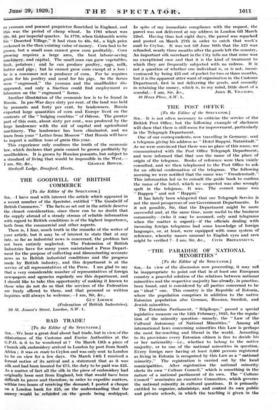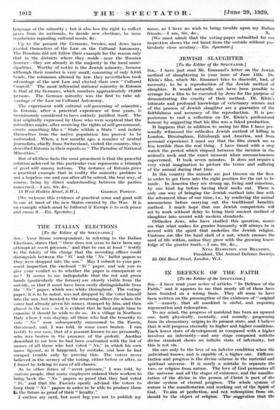"THE PARADISE OF NATIONAL MINORITIES" [To the Editor of the
SPECTATOR.] Stn,--In view of the discussion now proceeding, it may not be inappropriate to point out that in at least one European country a peaceful solution of the relations between national' minorities and the respective majority has already, in practice, been found, apd is considered by all parties concerned to be an " ideal" one. This country is the Republic of Estonia, where the population comprises in addition to the native Estonian population also German', Russian, Swedish, and Jewish minorities.
The Estonian Parliament, " Riigikogu," passed a special legislative measure on the 12th February, 1925, for the regulad tion of the minority question--namely, the " Law of the Cultural Autonomy of National Minorities." Among all international laws concerning minorities this Law is perhaps the most far-reaching and liberal in the world. According to its provisions every Estonian citizen is free to decide his or her nationality—i.e., whether to belong to the native majority, or to one of the national minorities in question. Every foreign race having at least 8,000 persons registered as living in Estonia is recognized by this Law as a " national minority." The registration' is carried out by the local municipalities. After registration the national minority elects its own " Culture Council," which is something in the' nature of a national parliament of its own. The " Culture Council " nominates an executive Committee, which governs the national minority in cultural questions. It is primarily entitled to organize, administer, and control its own public and private schools, in which the teaching is given in the
language of the minority ; but it also has the right to collect taxes from its nationals, to decide new elections, to issue regulations regarding cultural needs, &c.
: Up to the present the Germans, Swedes, and Jews have availed themselves of the Law on the Cultural Autonomy, The Russians did not follow their example for the reason only that in the districts where they reside—near the Russian frontier—they are already in the majority in' the local muni- cipalities. Worthy of notice is the Jewish minority, because although their number is very small, consisting of only 3,045 heads, the minimum allowed by law, they nevertheless took advantage of- the newel Law and elected their own " Cultural council." The most influential national minority in Estonia is that of the-Germans, which numbers approxiMately 18,000 persons. The German minority was the first ^to take ad- vantage of the Law on Cultural Autonomy.-
The experiment with cultural self-governing of minorities in Estonia, after a practical experience of four years, is unanimously considered to have entirely justified itself. The fear originally expressed by those who were sceptical that the Minorities might, after receiving the rights of self-government, create something like a "State within a State " and isolate themselves from the native population has proved to be unfounded. When, a few months ago, a number of neutral journalists, chiefly from Switzerland, visited the country, they described Estonia in their reports as " The Paradise of National Minorities."
But of all these facts the most prominent is •that the peaceful solution achieved in this particular case represents a triumph of good will among nations. The instance of Estonia gives a practical example that in reality the minority problem is not a hopeless one and can after all be solved, the best way, of course, being by direct understanding between the parties concerned.--I am, Sir, &c.,
. 15 West Halkin Street,.S.W.1. GEORGE POPOFF.
[WC welcome this evidence of practical sense and good will in one at least of the new States created by the War. It is an example which must be followed if Europe is to seek peace and ensue it.--Eo. Spectator.]









































 Previous page
Previous page